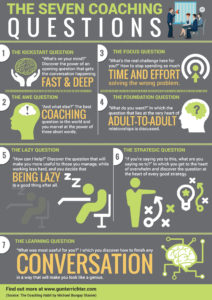Everyone Now Knows That Managers and Leaders Need to Coach Their People
In my last post I spoke about why annual performance reviews don’t work and what can be done instead. I suggested that this process be replaced instead by a coaching relationship. While coaching might not be familiar to many, here are seven questions that should drive every coaching conversation and get things goings.
The questions are presented in Michael Bungay Stanier’s book, The Coaching Habit: Say Less, Ask More & Change the Way You Lead Forever. The book maintains that coaching can increase focus and capacity, reduce overwhelm and dependency, and drive employee engagement. Managers need to learn the coaching habit and Stanier suggests that:
1. Coaching is simple (the seven questions will give you most of what you need).
2. You can coach someone in ten minutes or less.
3. Coaching should be frequent and not occasional.
4. A coaching habit can be developed.
The book is well worth the read and I encourage anyone that manages people or is responsible for helping guide careers read this book.
I have written this post and provided an infographic summarising the seven questions to get you started on building your coaching habit.
The Seven Coaching Questions
Question 1 – “What’s on your mind?”. This is the question that gets the conversation happening fast and deep. The beauty of this question is that it’s an open question and helps to get to the heart of the matter – understanding what is important to the person you are coaching. Stanier then suggests that you can deepen the conversation using the 3Ps – projects, people, patterns. Does what is on their mind relate to projects, i.e. the content they are currently working on? People, i.e. are there any challenges with the people they are working with? Patterns, i.e. the behavioural patterns of the person you are
Question 2 – “And what else?”. This question is a great tool to stop offering advice or a solution to what was discussed when you asked the first question. Asking this question really allows you to understand the issue in much greater detail. You should even go as far as to ask this question more times. Stanier advises asking it three to five times, looking for a response along the lines of “There is nothing else.”
Question 3 – “What’s the real challenge here for you?”. This is being aware that there might be a number of challenges in play but as a coach you need to understand what the specific challenge is that they are struggling to overcome. It is important to identify and focus on the real problem, not the first problem.
Question 4 – “What do you want?”. People often don’t really know what they want as well as confusing wants with needs. This question is there to help us understand exactly what the person wants. We also need to understand when to dig deeper and ask “what do you really want?”.
Question 5 – “How can I help?”. There are two key benefits to asking this question. Firstly, it stops us from thinking that we know exactly what the person needs, i.e. it stops us offering specific advice. Secondly, you are forcing the person to make a clear request, something that might not have been evident to him or her at the start of the conversation.
Question 6 – “If you are saying yes to this, what are you saying no to?”. With this question, you are asking your subject to be committed to what it is that they want. This ensures that people are not over-committing to things or just saying yes because that’s what they think they need to say. Again, you can use the 3Ps to unearth more detail; projects, people, patterns.
Question 7 – “What was the most useful for you?”. This adds additional value to the conversation. Ideally the person you are coaching understand what needs to be done to move forward and secondly, they are learning about this issue. Taking this approach affords the space to people to have these learning moments.
We’ve covered the seven questions at a very high level and I really would urge you to invest the time and make your way through Michael Bungay Stanier’s book.
Happy coaching and I would love to hear about your coaching experiences.


